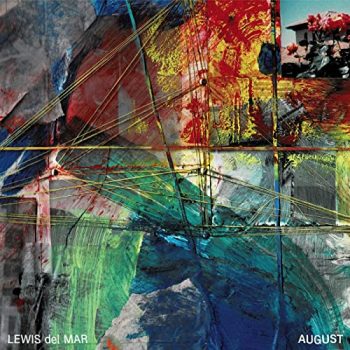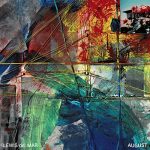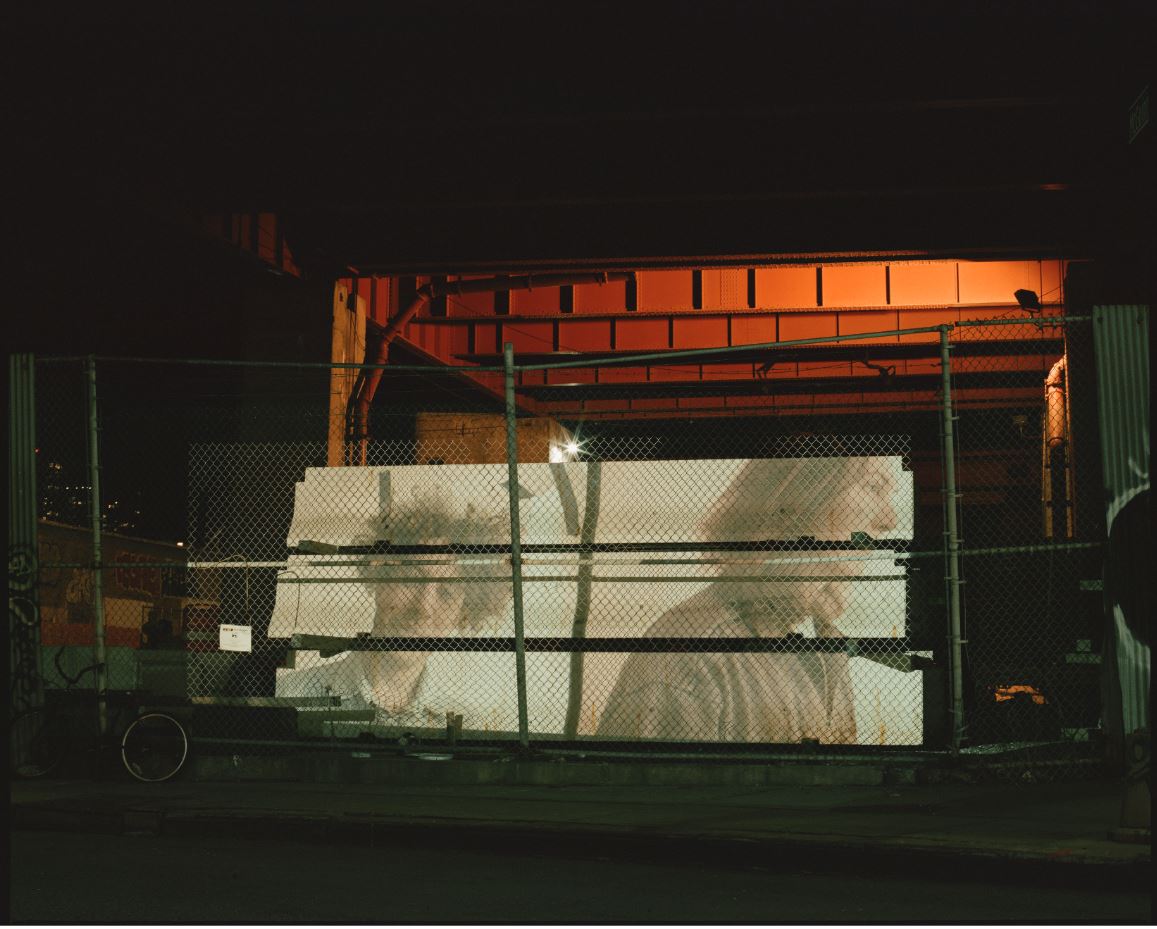Get reacquainted with experimental New York pop-duo Lewis Del Mar as they discuss their newest record, ‘AUGUST,’ talking through the writing process, their literary influences, what it takes to be vulnerable, and the community of friendship.
— —
It was in 2015 that Lewis Del Mar put out their explosive, pulsing single “Loud(y),” arresting both critical and popular attention. It was in 2016 that they released their self-titled debut album that further cemented their distinctiveness as a band. Caught somewhere between the broad labels of experimental pop and alternative rock, and armed with the sharp slant that was/is their song-writing, Daniel Miller and Max Harwood were doing something specific, something different. Four years later, this has definitely not changed.

Finally, they have a new album for us – AUGUST. Over the last four months — months saturated with unprecedented global lockdowns and escalating uncertainties — Lewis Del Mar has released five singles from this record. Careful glimpses into the world of AUGUST, arriving month after month. Drawing us back into the dream of their music. Made familiar by their sincerity but inflected with newer streams of wisdom and insight.
Atwood Magazine spoke with Lewis Del Mar about AUGUST; discussing their favourite songs from this long-awaited record, the books that have shaped it, the meanings of vulnerability, and the poignant, life-affirming friendship at the center of it all!
Listen: ‘AUGUST’ – Lewis Del Mar
A CONVERSATION WITH LEWIS DEL MAR

Atwood Magazine: Hello, hello, how does it feel to put out new music after a fairly long time? It's been nearly four years since we last heard from you.
Lewis Del Mar: It feels amazing. For us, creating art is very much about creating a dialogue with the world around you. The settings, the people, the collective thinking. When we were living with these songs on our hard drive there was a limit to the fulfillment they brought. Our aim is to foster connection through our work, so watching people bring these songs into their lives and relate to them feels like closing the loop.
What did this hiatus allow for? What did taking a break from your art practice mean for you, individually and as a band?
Lewis Del Mar: There was really no break from the practice on the whole. We took a moment to unwind when we got back from tour in the summer of 2017. But, even then we were brainstorming and shaping the project. By the fall of that year, we were back in full swing, writing every day. I think what the time allowed for was reflection, both on the music and our circumstances. There were a lot of songs we lived with for a while before deciding on their fate.
We essentially made two albums, and one of them probably won’t ever see the light of day (laughs). We also underwent a lot of changes in our business during this time. We didn’t feel as if we were on the right path to grow our group sustainably, so we had to chart a new way forward. All of that rearranging took a lot of time, but we wanted to make sure that when we came back with new music we were bringing it into the world with the right energy, and a better sense of the bigger picture.

You’ve mentioned before that you guys were inspired by certain books to write AUGUST; could you talk a little bit about that?
Lewis Del Mar: Yeah, literature has always been a huge part of our process. We both studied English in school, and reading has been a point of connection for us. There were several novels that really shaped this process. James Baldwin’s “Another Country” was a major driving force behind the initial conceptual framework. I was in the midst of a really wild summer in New York, and this novel just found me at the right time. It justified a lot of my emotions and legitimized my desire to write about what I was experiencing. Baldwin is one of my favorite artists. Marlon James “A Brief History of Seven Killings” and Juan José Millás “From the Shadows” also helped to inspire the voice of the surrealist storytelling that takes place throughout the project.
What's your favourite song from the album, and why?
Lewis Del Mar: We have a couple favorite songs, but our favorite moment is the transition from the Prologue into “Fever (CH. I).” We’d culled together so many songs, and fragments of songs in the making of this album. And this moment came together right at the end of the process when we just pulled this verse I’d written off the cutting room floor, and turned it into the album opener. The verse is a long retelling of a night my friends and I got jumped downtown. The details are one to one. It’s such a raw and honest way to begin the journey and its transition into “Fever” really evokes the emotional specificity of that summer. Anytime we’re able to get the work to line up with the feeling that inspired it is a huge victory. It’s something that we chase in every record we make, and this moment really stands out in that regard.
A lot of the writing for the record seems to be coming from a deeply interiorized, personal space, so what was the writing process for AUGUST like?
Lewis Del Mar: Pretty painful (laughs). Heading into a second album, I felt like the logical place to develop my writing was to a place of more detail, and specificity. There was so much chaos in my life throughout this process that it just felt like there was always something to draw from. If something made me afraid or uncomfortable, I moved towards it. A lot of the hyper-detailed, no-frills work didn’t even end up making the album because it was too pointed. But writing is really a form of therapy for me, so I prefer to just go all the way, and then make a decision about the work’s quality later.
Watch: “The Ceiling” – Lewis Del Mar
What was the toughest thing about making AUGUST? And what was the most rewarding?
Lewis Del Mar: The toughest part was figuring out how it was that we wanted to evolve. We wrote the entire first album on our own, and we knew this time that we wanted a larger network of our people in the creation of the album. But, it took a lot of experimentation and time to find those collaborators, and then to land at a place where the soundscape was feeling like the right next step. We’d say the most gratifying moment was probably when we went to LA to finish the album in the summer of last year.
We were sleeping on the floor of our friend Casper’s studio and just working around the clock with him. Everything slid into place then, and it was so gratifying. That trip gave the album its third dimension, and we came back to New York knowing we’d made something we were proud of.
Does AUGUST have a thematic/conceptual structure, and if so, how was this arrived at? What is the significance of the ''Prologue'' and the ''Epilogue''?
Lewis Del Mar: The album very much has a conceptual framework, and it was something that developed over a long dialogue of ideas and experimentation. We knew early on that we wanted to base the album around the chaos and scattered emotions of a summer I spent living in the East Village when my life sort of began to unravel. We really pounded away at that concept, but, eventually, we were feeling like it was lacking a dimension or resolve. And that is really when CH.
III began to take shape, this sort of moment of clarity and reflection that appears on the last third of the album. The project really tracks the development of someone whose anxieties and lifestyle prevent them from seeing beyond themselves, as they learn to access a wider lens on the world, a more present vision. The chapters almost work like rings of self-awareness. The prologue serves as a descent into the madness of the summertime in New York, and the epilogue is a reprise of the prologue. We did this to insinuate that these moments of development and overcoming are cyclical, as soon as one ends, another begins”
The lyric ''You are my mother, my father, my brother'' from ''Rosalie'' is one of many pieces of writing that stands out on the record -- it's both frightening and beautiful, this kind of all-encompassing sense of intimacy: what kind of thought or experience makes writing like this possible?
Lewis Del Mar: I wrote about the story behind this song in a post right before the song’s release. It was an experience that has never left me. I saw a woman kneeling over her dead son. And that relationship between a mother and her son, the grief we experience, the complete sense of loss and helplessness we feel when we learn we cannot protect the people we love. These are universal themes. And I think all I’m trying to get at with my writing is helping to illuminate those lines and to allow others to find them in our music. What I felt when I saw that scene was that the woman could have been my mother, and those were the words I chose to express that sentiment.

How did your wonderful and long friendship figure into making AUGUST?
Lewis Del Mar: At this point, I think many of the ways that our friendship manifests itself in our work are imperceptible to us. We’ve been playing together for so long now, even the telepathy we share as musicians feels second nature. We’ve grown accustomed to reading each other’s inclinations. It’s like water. Our bond accounts for so much of the dialogue between the writing and the production on this album. We really pushed ourselves to connect those dots in ways that we hadn’t before. It also helped in making an album that was deeply personal, because we shared a familiarity with all of the people, places, and moments that shaped this work. Max is one of the only friends in my life who knows my father. It made me feel very comfortable exploring these more difficult themes.
How did you arrive at the gorgeous and memorable cover art of the songs you released before the album? What kind of conversation were you having with visual artists, if any?
Lewis Del Mar: When we were on tour in 2017 I went to Pompidou in Paris, and saw Cy Twombly’s work in person for the first time. It really struck me, and there was one painting there in particular called “Summer Madness” that became a huge touchstone for the music on AUGUST. Twombly was a part of the abstract impressionist school, and I knew that I wanted to take the music into this more cerebral and impressionistic place. So, that led me to track down other references. Our close friend Jason Sondock made all the covers. He’s actually a film director, so we had to push him outside his comfort zone to get these. While we were making the album, him and I went to MoMA for a Rasuschenberg retrospective. It was a great exhibit, but at the end there were these show posters that he’d done for all his exhibits, and they just stopped us in our tracks. It felt like the perfect visual counterpoint for the album. Our covers ended up looking pretty distinct in the end, but the nature of his approach to bricolage and abstraction was very much something we touched upon repeatedly in developing this idea.
There are some heavy and pensive tracks on the album -- ''Border (Ch.III)'' and ''Sewers,'' for example -- what has it meant to write this kind of music, to be this vulnerable?
Lewis Del Mar: As I mentioned earlier, writing is really a therapeutic practice for me. I do it to process my experience, and to make sense of the knots in my thinking. A lot of times I can’t fully understand something until I write about it. So, for me, writing is just what helps me get by. As we’ve developed a following, it’s been harder for me to access that place at times. Because there becomes this other element of the “audience,” and after you’ve seen them at shows, and interacted with them online, you have a pretty clear picture of who it is that fucks with you. So, it’s easy to sit there and say, “will they think this is too much, or too little?” … etc.
But over time now I’ve found new ways to silence that. I write well under pressure, generally. I wrote Border in about twenty minutes after getting off the plane in LA, when we really needed a handful of songs to complete the project. But it had lived in my heart for a couple years at that point. The idea sort of gesticulates and takes form. And then one day, it just falls out.
Watch: “TV” – Lewis Del Mar
Do you think AUGUST will alter/affect critical opinion of the band? Was this something that you worked with as you made AUGUST?
Lewis Del Mar: It’s not really advisable to sweat that stuff. Because there is little rhyme or reason to what writers deem relevant. The only common thread is that if one of them writes about it, they’re all going to write about it. The feedback loop is so strong nowadays, it just seems to overpower individual thinking. Which makes critical acclaim seem less appealing, or meaningful. And as far as I’ve seen, it only complicates your creativity when people are paying attention to it like that. The accolade we’re after is building a sustainable career, and that is done by respecting your fanbase and the people that already support what you’re doing.
What is something you want listeners/fans to take back from AUGUST?
Lewis Del Mar: We don’t have any expectations of our fans. We hope they will listen to the whole album because it’s a little long and there are some heaters on the B Side!
What is Lewis Del Mar now?
Lewis Del Mar: We’re a product of our community. Nearly every person in our creative circle is a very close friend. Many of them are names and characters that appear throughout the songs. The work we’ve done around this album has taken a village. And we’re constantly humbled that our amazingly talented friends are willing and excited to adopt our vision. It makes the entire process extremely gratifying regardless of the outcome.
— —

Connect to Lewis Del Mar on
Facebook, Twitter, Instagram
Discover new music on Atwood Magazine
? © rubberband.
:: Stream Lewis Del Mar ::









